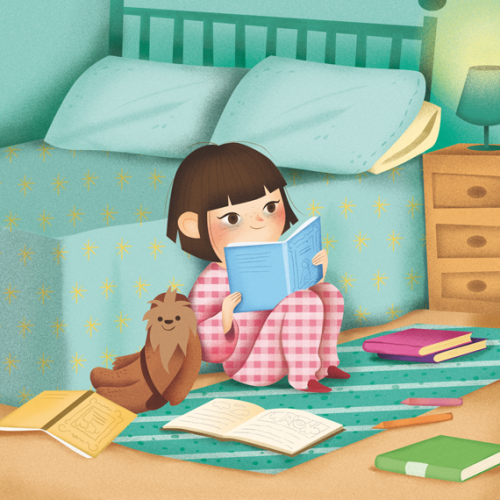
“When attempts to fall asleep fail, adrenaline secretion increases,
and children enter a state of increasing anxiety,
which makes the person trying to fall asleep remain awake.”
(Ceberio, 2020)
On many occasions, throughout this confinement, we have received queries about some difficulties that have arisen in one of the most important routines and activities of the day, or rather of the night: Sleep.
Sleep has been one of the most frequently chosen topics for study and research in the disciplines of neurology and psychology. It is considered one of the most important factors when evaluating people's mental health, since sleep not only regulates moods, but also the human being as a whole, affecting the immune, endocrine, nervous and motor systems, among others. For this reason, we must pay special attention to external factors, both social and environmental, and to habits that may affect its quality.
Sleep is defined as an easily reversible process in which the human being adopts a stereotyped posture. During sleep, consciousness decreases and reactivity to external stimuli increases. It is associated with relaxation and immobility, and usually occurs with a circadian periodicity, that is, it occurs every day at approximately the same time.
Sleep is a factor that significantly affects memory and learning at all stages of life. Achieving a healthy sleep before learning situations is a factor that can favor the incorporation of content and skills. Some studies indicate that, when sleep is consolidated, mental processes of reactivation and recapitulation of previously learned information are activated. This is why getting a good rest is especially important before the stages in which we are most exposed to learning, such as the school stage.

Another characteristic to highlight in this topic is that each person has different needs regarding sleep, and for this reason we think it is important to identify personal patterns when preparing for rest. According to experts, there are three sleep patterns: short, determined by 5 hours of daily sleep, intermediate, where sleep duration is approximately 7 or 8 hours daily, and long, where people sleep at least 9 hours a day. There is also a fourth pattern that is defined as variable: it is one in which people do not have consistency in their sleep habits. To achieve greater physical and mental well-being, we should approach the intermediate sleep pattern, managing to sleep 7 to 8 hours a day, with its inevitable exceptions marked by social and environmental factors that affect us directly or indirectly.
Bettina Tassino, a doctor in Biological Sciences and specialist in this subject, describes in the Sleep Cycle column of the No Toquen Nada Program (FM Del Sol), two models of people regarding sleep and their level of greatest activity: “larks” and “owls”. She defines “larks” as people who function better in the morning, and “owls” as those who are more active or effective at night in the tasks they undertake. Thus, she explains that the biological clock of adolescents has a tendency to be “delayed”, with a rather late or owl-like functioning, which can complicate their adaptation to the high school activities proposed in the early hours of the morning.
To go deeper, We consulted Elianne Silberman, a child and adolescent psychologist specializing in sleep., who shared his view with us, as follows:
Why do you think sleep is important for children?
Sleep is essential for children's development. Just think of some of the benefits of getting a good night's sleep, especially in childhood:
• stimulates learning
• improves mood
• reduces stress
• benefits the immune system
• restores the brain
• helps boost imagination
• recovers energy.
How would you define a sleep disorder? What types are there?
Sleep disorders are problems related to sleep. These include difficulties in falling asleep and staying asleep. Falling asleep at inappropriate times and sleeping excessively are abnormal behaviors during sleep. Sleep is a physiological need; it is a human behavior that is educated and trained.
We talk about Sleep Disorders in children when their daily life is significantly affected, including the parent-child relationship, the relationship of the entire family and their social and school relationships.
The most important thing is to identify that there is a Sleep Disorder that is affecting the child in order to begin, as soon as possible, to resolve it.
The most important sleep disorders in childhood are:
• insomnia,
• restless legs syndrome,
• delayed phase syndrome,
• sleep apnea-hypopnea syndrome,
• sleepwalking,
• the terrors of sleep,
• confusional awakening,
• nightmares,
• rhythmic movements,
• narcolepsy.
Each of them is very different from each other and has different causes and forms of treatment.
How do you think times of crisis, such as this time of pandemic, affect the sleep of children and adolescents? What recommendations would you give to families, for this particular time?
Since March, when the pandemic hit our country, routines as well as the quality and quantity of sleep of children and adults have been turned upside down. I would tell them to remember that sleeping is a necessary activity, which restores the basic physical and psychological balance of people. Each child is unique and often requires slightly different hours of rest. That is why I suggest some recommendations for these times of so much disorganization regarding schedules and routines at home and for managing new work devices at school.
Taking care of your sleep hygiene:
• Maintain similar schedules each day to begin the bedtime routine at night.
• Take care of the bedroom environment: associate the bed with sleeping, avoid the bed as a possible space for eating, playing, etc. in school-age children.
• Remember that it is important to be exposed to natural light in the morning and try to keep the room as dark as possible at night. In the case of children with fears, they can use night lights or dim lights to help secrete the sleep hormone (Melatonin).
• Encourage relaxing behaviors before going to bed.
Daily Routine:
• It is essential to have a routine during the week and on weekends or holidays we can be more flexible.
• Routines organize us, structure us, and give us confidence. They are especially important at night, as they give children greater security and prevent anger or tantrums before going to bed.
• Choose a time to start your routine at home.
• Choose with your children what pleasant activity they will do before going to sleep. Is it a bath? Is it a story? Is it a massage or a song? Any relaxing behavior before going to sleep will be beneficial.
• Avoid exposure to screens before bed. In addition to stimulating children and speeding them up, they are not beneficial for a good night's sleep. It is not about banning them, but rather about ensuring their proper use and finding moments within the daily routine of each home where it is beneficial to use them.
These are just a few recommendations. As you can see, there are many aspects to take into account when thinking about getting a good night's sleep. If children or adolescents are going through a crisis or sleep disorder, the good news is that there is a solution. The key is to be patient and perseverant!
Other recommendations to consider:
- Sleep diary: It is advisable to keep a notebook on your bedside table that can be used as a receiver of thoughts, worries and emotions that come to mind at bedtime, so that you can then return to it the next morning.
- Identify your own sleep pattern by recording in your sleep diary your bedtime, hours of rest, ease or difficulty in falling asleep, and times when sleep is interrupted during the night.
- Body relaxation: Instrumental music can be used to accompany this moment. Practice rhythmic breathing to help relax your muscles.
References:
→ http://www.scielo.org.mx/scielo.php?script=sci_arttext&pid=s0026-17422013000400002
→ https://lamenteesmaravillosa.com/cual-es-tu-patron-de-sueno-y-como-influye-en-tu-salud/
→ https://lamenteesmaravillosa.com/los-terrores-nocturnos-en-los-ninos/
→ Column in the program “No toquen Nada” – Del Sol FM. Chapter 3 of the sleep cycle. High school schedules, adolescent performance, and the advantage of shifts.
→ To expand:
Elianne Silberman_ Instagram: @sos_zzz
Ps. Ines Abreu
Ps. Maria Noel Gonzalez Farina